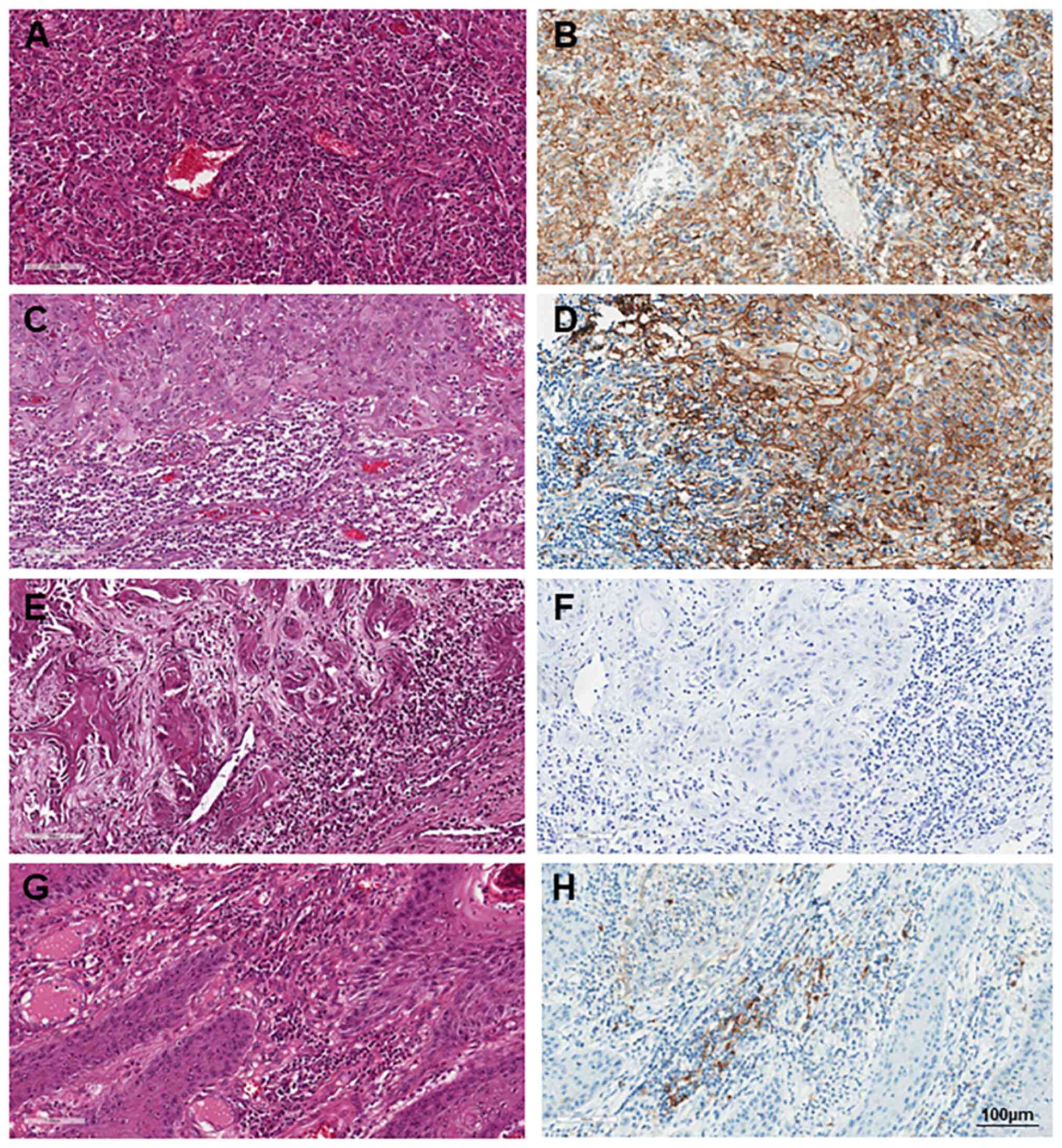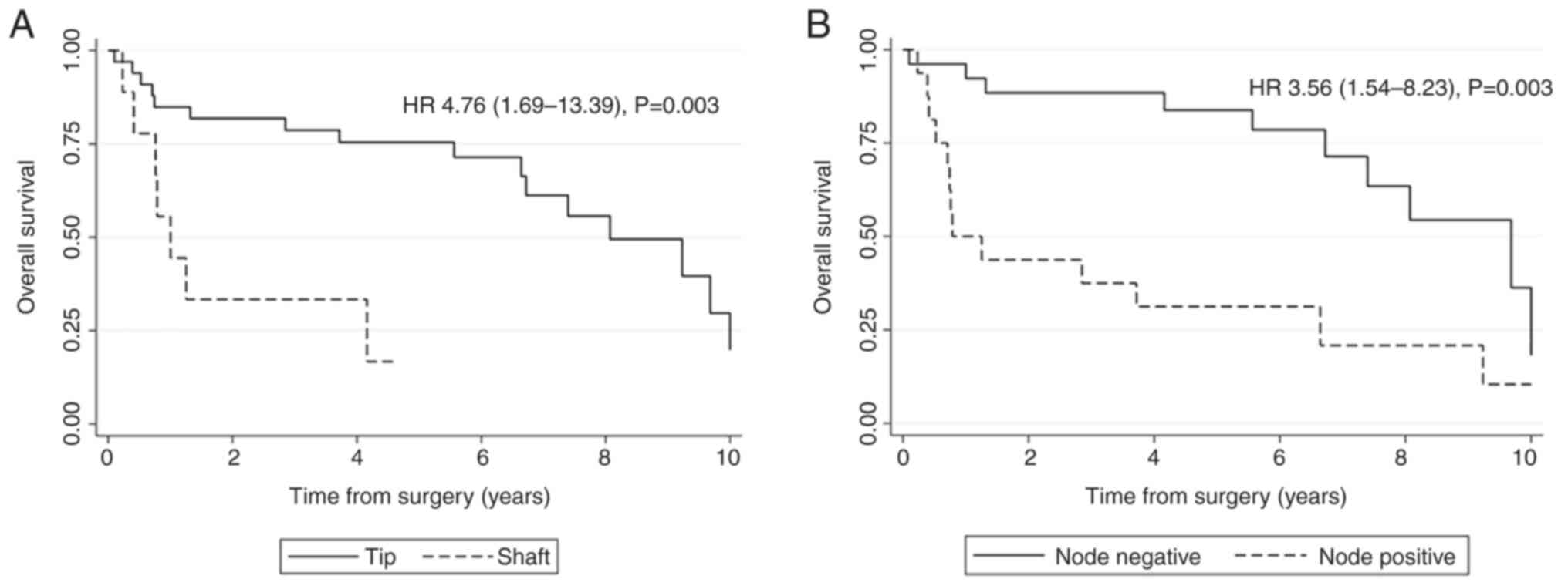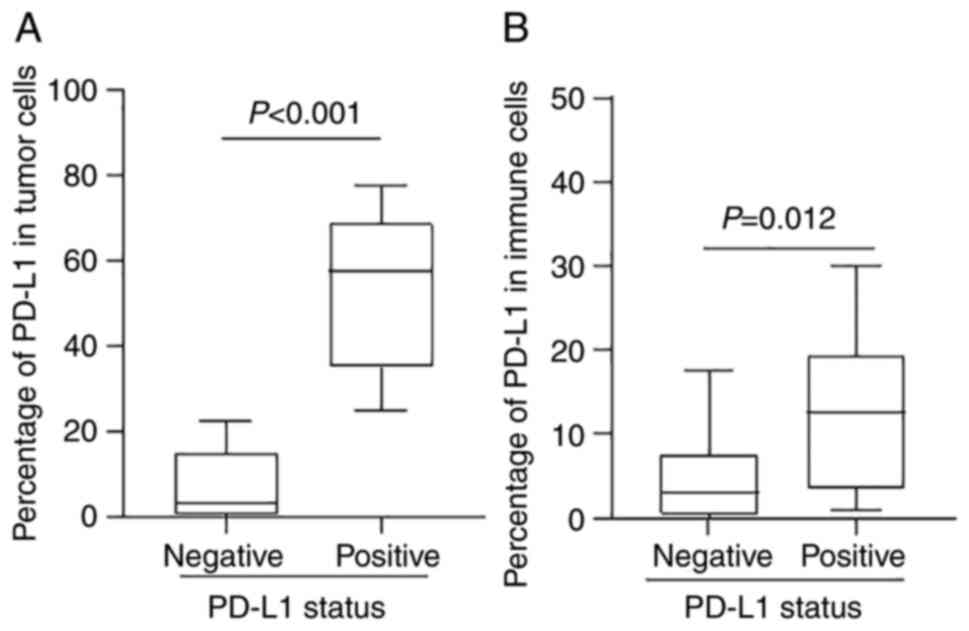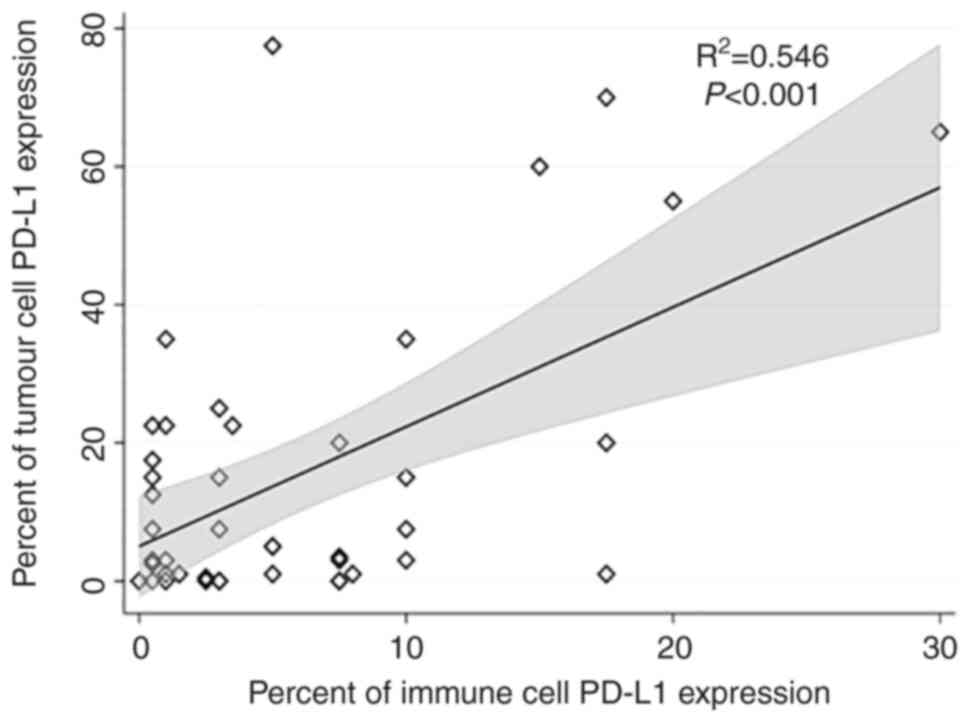|
1
|
Hakenberg OW, Comperat EM, Minhas S,
Necchi A, Protzel C and Watkin N: EAU guidelines on penile cancer:
2014 Update. Eur Urol. 67:142–150. 2015.PubMed/NCBI View Article : Google Scholar
|
|
2
|
Christodoulidou M, Sahdev V, Houssein S
and Muneer A: Epidemiology of penile cancer. Curr Probl Cancer.
39:126–136. 2015.PubMed/NCBI View Article : Google Scholar
|
|
3
|
Deng X, Liu Y, Zhan X, Chen T, Jiang M,
Jiang X, Chen L and Fu B: Trends in incidence, mortality, and
survival of penile cancer in the United States: A population-based
study. Front Oncol. 12(891623)2022.PubMed/NCBI View Article : Google Scholar
|
|
4
|
Vieira CB, Feitoza L, Pinho J,
Teixeira-Júnior A, Lages J, Calixto J, Coelho R, Nogueira L, Cunha
I, Soares F and Silva GEB: Profile of patients with penile cancer
in the region with the highest worldwide incidence. Sci Rep.
10(2965)2020.PubMed/NCBI View Article : Google Scholar
|
|
5
|
Fu L, Tian T, Yao K, Chen XF, Luo G, Gao
Y, Lin YF, Wang B, Sun Y, Zheng W, et al: Global pattern and trends
in penile cancer incidence: Population-based study. JMIR Public
Health Surveill. 8(e34874)2022.PubMed/NCBI View
Article : Google Scholar
|
|
6
|
Boussiotis VA: Molecular and biochemical
aspects of the PD-1 checkpoint pathway. N Engl J Med.
375:1767–1778. 2016.PubMed/NCBI View Article : Google Scholar
|
|
7
|
Ribas A: Tumor immunotherapy directed at
PD-1. N Engl J Med. 366:2517–2519. 2012.PubMed/NCBI View Article : Google Scholar
|
|
8
|
Huang Y, Zhang SD, McCrudden C, Chan KW,
Lin Y and Kwok HF: The prognostic significance of PD-L1 in bladder
cancer. Oncol Rep. 33:3075–3084. 2015.PubMed/NCBI View Article : Google Scholar
|
|
9
|
Mok TSK, Wu YL, Kudaba I, Kowalski DM, Cho
BC, Turna HZ, Castro G Jr, Srimuninnimit V, Laktionov KK,
Bondarenko I, et al: Pembrolizumab versus chemotherapy for
previously untreated, PD-L1-expressing, locally advanced or
metastatic non-small-cell lung cancer (KEYNOTE-042): A randomised,
open-label, controlled, phase 3 trial. Lancet. 393:1819–1830.
2019.PubMed/NCBI View Article : Google Scholar
|
|
10
|
Ueda K, Suekane S, Kurose H, Chikui K,
Nakiri M, Nishihara K, Matsuo M, Kawahara A, Yano H and Igawa T:
Prognostic value of PD-1 and PD-L1 expression in patients with
metastatic clear cell renal cell carcinoma. Urol Oncol.
36:499.e9–499.e16. 2018.PubMed/NCBI View Article : Google Scholar
|
|
11
|
Zhu L, Sun J, Wang L and Li Z, Wang L and
Li Z: Prognostic and clinicopathological significance of PD-L1 in
patients with bladder cancer: A meta-analysis. Front Pharmacol.
10(962)2019.PubMed/NCBI View Article : Google Scholar
|
|
12
|
Davidsson S, Carlsson J, Giunchi F, Harlow
A, Kirrander P, Rider J, Fiorentino M and Andrén O: PD-L1
expression in men with penile cancer and its association with
clinical outcomes. Eur Urol Oncol. 2:214–221. 2019.PubMed/NCBI View Article : Google Scholar
|
|
13
|
De Bacco MW, Carvalhal GF, MacGregor B,
Marcal JMB, Wagner MB, Sonpavde GP and Fay AP: PD-L1 and p16
expression in penile squamous cell carcinoma from an endemic
region. Clin Genitourin Cancer. 18:e254–e259. 2020.PubMed/NCBI View Article : Google Scholar
|
|
14
|
Müller T, Demes M, Lehn A, Köllermann J,
Vallo S, Wild PJ and Winkelmann R: The peri- and intratumoral
immune cell infiltrate and PD-L1 status in invasive squamous cell
carcinomas of the penis. Clin Transl Oncol. 24:331–341.
2022.PubMed/NCBI View Article : Google Scholar
|
|
15
|
Udager AM, Liu TY, Skala SL, Magers MJ,
McDaniel AS, Spratt DE, Feng FY, Siddiqui J, Cao X, Fields KL, et
al: Frequent PD-L1 expression in primary and metastatic penile
squamous cell carcinoma: Potential opportunities for
immunotherapeutic approaches. Ann Oncol. 27:1706–1712.
2016.PubMed/NCBI View Article : Google Scholar
|
|
16
|
Oken MM, Creech RH, Tormey DC, Horton J,
Davis TE, McFadden ET and Carbone PP: Toxicity and response
criteria of the eastern cooperative oncology group. Am J Clin
Oncol. 5:649–655. 1982.PubMed/NCBI
|
|
17
|
Moch H, Cubilla AL, Humphrey PA, Reuter VE
and Ulbright TM: The 2016 WHO classification of tumours of the
urinary system and male genital organs-part A: Renal, penile, and
testicular tumours. Eur Urol. 70:93–105. 2016.PubMed/NCBI View Article : Google Scholar
|
|
18
|
Amin MB, Edge S, Greene F, Byrd DR,
Brookland RK, Washington MK, Gershenwald JE, Compton CC, Hess KR,
Sullivan DC (eds), et al: AJCC cancer staging manual (8th edition).
Springer International Publishing: American Joint Commission on
Cancer, 2017.
|
|
19
|
Tai P, Yu E, Cserni G, Vlastos G, Royce M,
Kunkler I and Vinh-Hung V: Minimum follow-up time required for the
estimation of statistical cure of cancer patients: Verification
using data from 42 cancer sites in the SEER database. BMC Cancer.
5(48)2005.PubMed/NCBI View Article : Google Scholar
|
|
20
|
Shitara K, Ajani JA, Moehler M, Garrido M,
Gallardo C, Shen L, Yamaguchi K, Wyrwicz L, Skoczylas T, Bragagnoli
AC, et al: Nivolumab plus chemotherapy or ipilimumab in
gastro-oesophageal cancer. Nature. 603:942–948. 2022.PubMed/NCBI View Article : Google Scholar
|
|
21
|
Fradet Y, Bellmunt J, Vaughn DJ, Lee JL,
Fong L, Vogelzang NJ, Climent MA, Petrylak DP, Choueiri TK, Necchi
A, et al: Randomized phase III KEYNOTE-045 trial of pembrolizumab
versus paclitaxel, docetaxel, or vinflunine in recurrent advanced
urothelial cancer: Results of >2 years of follow-up. Ann Oncol.
30:970–976. 2019.PubMed/NCBI View Article : Google Scholar
|
|
22
|
Munhoz RR and Postow MA: Clinical
development of PD-1 in advanced melanoma. Cancer J. 24:7–14.
2018.PubMed/NCBI View Article : Google Scholar
|
|
23
|
Powles T, Plimack ER, Soulières D, Waddell
T, Stus V, Gafanov R, Nosov D, Pouliot F, Melichar B, Vynnychenko
I, et al: Pembrolizumab plus axitinib versus sunitinib monotherapy
as first-line treatment of advanced renal cell carcinoma
(KEYNOTE-426): Extended follow-up from a randomised, open-label,
phase 3 trial. Lancet Oncol. 21:1563–1573. 2020.PubMed/NCBI View Article : Google Scholar
|
|
24
|
Montella M, Sabetta R, Ronchi A, De Sio M,
Arcaniolo D, De Vita F, Tirino G, Caputo A, D'Antonio A, Fiorentino
F, et al: Immunotherapy in penile squamous cell carcinoma: Present
or future? Multi-target analysis of programmed cell death ligand 1
expression and microsatellite instability. Front Med (Lausanne).
9(874213)2022.PubMed/NCBI View Article : Google Scholar
|
|
25
|
Joshi VB, Spiess PE, Necchi A, Pettaway CA
and Chahoud J: Immune-based therapies in penile cancer. Nat Rev
Urol. 19:457–474. 2022.PubMed/NCBI View Article : Google Scholar
|
|
26
|
Ottenhof SR, Djajadiningrat RS, de Jong J,
Thygesen HH, Horenblas S and Jordanova ES: Expression of programmed
death ligand 1 in penile cancer is of prognostic value and
associated with HPV status. J Urol. 197:690–697. 2017.PubMed/NCBI View Article : Google Scholar
|
|
27
|
Lu Y, Wang Y, Su H and Li H: PD-L1 is
associated with the prognosis of penile cancer: A systematic review
and meta-analysis. Front Oncol. 12(1013806)2022.PubMed/NCBI View Article : Google Scholar
|
|
28
|
Buonerba C, Scafuri L, Costabile F,
D'Ambrosio B, Gatani S, Verolino P, Trolio RD, Cosimato V, Verde A
and Lorenzo GD: Immune checkpoint inhibitors in penile cancer.
Future Sci OA. 7(FSO714)2021.PubMed/NCBI View Article : Google Scholar
|
|
29
|
Tang Y, Hu X, Wu K and Li X: Immune
landscape and immunotherapy for penile cancer. Front Immunol.
13(1055235)2022.PubMed/NCBI View Article : Google Scholar
|
|
30
|
Long XY, Zhang S, Tang LS, Li X and Liu
JY: Conversion therapy for advanced penile cancer with tislelizumab
combined with chemotherapy: A case report and review of literature.
World J Clin Cases. 10:12305–12312. 2022.PubMed/NCBI View Article : Google Scholar
|


















